 Biology (pre 2008)
Biology (pre 2008)
10 December 2007
Switching Gayness On And Off
Biologists have used both genetic manipulation and drugs to switch on and off homosexual behavior in fruit flies...
27 November 2007
Lake Vostok Meltdown
Scientists have melted million-year-old ice from 2 miles under Antarctica and are about to search the melt-water for ancient microbes...
20 November 2007
New Molecular Insights Into Post-Coital "Ladies' Choice"
Scientists report possible biochemical proof that the reproductive system of female mammals can "sense" the presence of sperm and "choose" which males' sperm fertilizes the egg...
14 November 2007
New Rationale For Biological Complexity Proposed
A changing environment and the biochemistry of horizontal gene transfer are the factors that make modularity and hierarchy - and complexity - prevalent in biology...
29 October 2007
New Holder Of Hottest Chile Record
Bhut Jolokia, a variety of chile pepper originating in Assam, India, has taken the title of world's hottest...
29 August 2007
Dehydrated Females Quench Thirst With Ejaculate
The males of some insect species produce unusually large quantities of ejaculate (up to 10 percent of their body weight), tempting dehydrated females to accept sexual invitations simply to get hold of the water in the male's seminal fluid...
10 August 2007
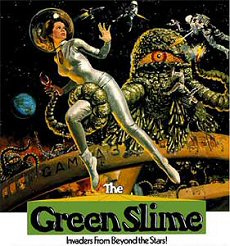 Microbial Awakenings
Microbial Awakenings
Australian boffins were cock-a-hoop this week over the fossilized 3.5 billion-year-old life forms that they found; despite detractors saying that the fossils may not be organic matter. As Bones, of Star Trek, was fond of saying; "It's life Jim, but not as we know it." Meanwhile, another research team is busy bringing ancient frozen microbes back to life...
26 July 2007
Poor Matching Improves Accuracy
Molecular recognition and the binding of molecules has traditionally been viewed as analogous to a lock and key, but in numerous real-world examples, the molecules are not an exact fit, which surprisingly, has actually been found to improve binding accuracy...
4 July 2007
Sperm Used To Clone Male Genome
Injecting a single mouse sperm into a mouse egg from which the nucleus had been removed, scientists have managed to successfully clone the male mouse genome...
14 June 2007
Evidence Of Altruism In Plants
Potted plants can recognize their kin and change their behavior to ensure that their siblings get a fair share of water and nutrients, says a Canadian biologist...
23 May 2007
Chernobyl Fungus Feeds On Radiation
New evidence suggests that certain fungi possess the ability to use radioactivity as an energy source for making food and spurring their growth...
17 May 2007
Proteins Play The Piano
Hoping to more easily identify patterns in protein sequences, molecular biologists have turned the sequences into original compositions of classical music...
23 March 2007
Biochemical "Noise" Critical For Regulating Biological Processes
Previously thought to be a hindrance in biology, biochemical "noise" - for example, the slight variations that occur in protein production - appears to play a key role in controlling and tuning biological processes...
2 February 2007
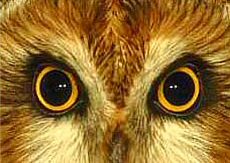 Survival Of The Cutest
Survival Of The Cutest
The protection of endangered species is central to many conservation agencies, yet invariably it's the same pleasing-to-the-eye creatures that hog the limelight. Sumatran Tigers and baby Harp Seals push the right buttons with the public, but would promotional images of an endangered Antigua Ground Lizard or Wyoming Toad elicit the same response? Probably not, with new research predicting that only the most aesthetically pleasing creatures may survive humankind's continued reshaping of the Earth...
31 January 2007
Scientists Mull Why Size Matters
Researchers are trying to understand why males are larger than females in some animal species (most mammals), while females are larger than males in others...
22 December 2006
Nano-Critters Found In Mine Sludge
Shotgun sequencing of acidic slime from a disused mine site has turned up a totally new phylum of Archaea...
20 December 2006
Mayo Clinic Zooms In On Nanobacteria
Researchers have been given a tantalizing glimpse of what could be the smallest living creatures on the planet...
13 December 2006
Regeneration Hinges On Cell Death
Paradoxically, regenerating a limb or growing a spinal cord is dependent on the death of certain cells...
3 November 2006
Creature With No Brain Makes New Phylum A No-Brainer
A worm-like creature from the depths of the North Atlantic has led to the establishment of a new phylum, a rare event considering most major categories were already thought to be known...
20 October 2006
Exotic Underground Bacteria Thrive On Radiation Rather Than Sunlight
Unusual bacteria that live two miles underground are one of the few life-forms on Earth to exist without sunlight; instead feeding on hydrocarbons irradiated by uranium ore...
21 July 2006
Universal DNA Switch Shakes Up Biology
The startling discovery that all forms of life on Earth use the very same mechanism to initiate a cell's division into twin daughter cells has caused somewhat of a commotion among biologists. It may not sound like much to the layman, but the discovery casts doubt on a number of long-standing and cherished biological models. But rather than it being a crisis in biology, it simply shows how science - in an era that some have dubbed the dawn of a "scientific dark age" - remains as vital and dynamic as ever...
30 June 2006
Designed By Mother Nature
Developing a new technology from scratch is a complex and time consuming business, so wouldn't it be handy if scientists had a pre-existing blueprint at their disposal? As it happens, they do, and fortuitously it exists all around us: nature. And using nature as your template provides the added bonus of not having to worry about pesky patents. The science of copying nature, known as biomimetics, is not altogether new - think radar, Velcro and da Vinci's flying machines - but it is garnering increasing attention, with anything from the biomechanics of frog legs, to the sensing ability of rat's whiskers, being used as a basis for new inventions...
9 June 2006
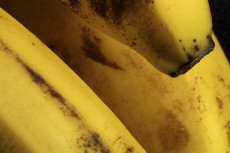 Yes, We Have No Bananas
Yes, We Have No Bananas
The banana is the most exported fruit in the world, and the fourth most important crop behind rice, wheat and maize. Nearly all of the bananas bound for the world market, and your local supermarket shelves, are of the Cavendish variety, leaving the banana market in a precarious eggs-in-one-basket situation. There have been warnings of banana crop extinctions coming from various sources for a number of years now, but the most recent one from the United Nation's Food and Agriculture Organization says that unless extra care is taken in maintaining species diversity, the banana may soon disappear...
19 May 2006
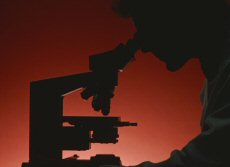 Into The Shadows - Searching For Alien Life On Earth
Into The Shadows - Searching For Alien Life On Earth
People with obsessive-compulsive hand-washing syndrome should stop reading right now. As well as all the microbes we do know about, some scientists suggest there could also be alien microbes living on Earth as well. This as yet undetected alien population of microbes could exist quite happily next to our own, and as such has been referred to as the "shadow biosphere"...
12 May 2006
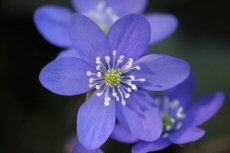 Botanic Mechanics Celebrate 150 Year Long Experiment
Botanic Mechanics Celebrate 150 Year Long Experiment
Apparently, watching grass grow isn't quite as boring as you may expect, and can, in fact, be downright fascinating. This is especially true if you happen to be one of the many ecologists eagerly anticipating the arrival of The Park Grass Experiment's 150th anniversary celebrations, which will be held at Rothamsted Research later this month. After a century and a half, The Park Grass Experiment is in fact the world's longest running ecological experiment...
28 March 2006
Primordial Soup-In-A-Cup
An accelerated in vitro experiment shows how an RNA enzyme develops into a DNA enzyme without losing its original function...
20 January 2006
Birds Ain't Doing It, Bees Ain't Doing It, And Biodiversity Is The Victim
A global decrease in pollinators such as birds, bees and flies means that plants in biodiverse hotspots are not getting enough pollen to reproduce. While it's possible for plants to self-pollinate, this alone does not progress or strengthen the species, as, like any other living organism, a plant needs genetic variation in order for the species to survive. And it's this lack of genetic variation that could make widespread plant extinctions unavoidable...
13 January 2006
Direct Observations Of Circadian Processes Reveal New Layers Of Complexity
Using an obscure imaging technique known as fluorescence resonance energy transfer, scientists have directly observed cellular circadian processes and found that the circadian clock is based on other protein clocks that run in six hour cycles...
21 November 2005
Sex Life Of Bacteria Under The Microscope
Working with E.coli, scientists have been studying metabolic networks to understand the how, why and where of bacterial gene transfer...
27 October 2005
The Eyes Don't Have It
The first images of living human retinas have found that the number of color-sensitive cones in the human retina differs dramatically among people - by up to 40 times...
7 October 2005
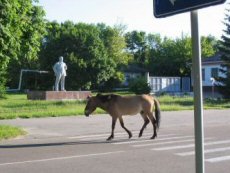 Chernobyl: No People But A Thriving Ecosystem
Chernobyl: No People But A Thriving Ecosystem
After the meltdown, the prognosis for Chernobyl and its environs - succinctly dubbed by the Soviets as the Zone of Alienation - was grim. But surprisingly, Chernobyl's surrounding flora and fauna have flourished remarkably. Author Mary Mycio vividly describes an extraordinary - and at times unearthly - new ecosystem that is flourishing in this no-man's land, where radiation levels are too intense for people to live...
30 September 2005
Frog Gunk Blocks HIV
It's a pity that frogs and other amphibians are disappearing as a peptide secreted from the skin of a small tropical frog appears to be a potent blocker of HIV infection...
1 September 2005
Forget Horsepower, Think Cow-Power
Rumen fluid - found in the digestive system of cows - contains microbes that can be used to generate prodigious amounts of electric power...
5 July 2005
Something Fishy About Sound
A new study has found a direct line of communication between the part of the brain that controls the vocal muscle system and the part of the ear that hears sound...
24 June 2005
Microbes Act As Tiny Electric Generators
A tiny biological structure that is highly electrically conductive could help clean up groundwater and produce electricity from renewable resources...
29 April 2005
Microbial Fuel Cell Produces Hydrogen & Cleans Wastewater
An electrically-assisted fuel cell device uses bacteria to coax four-times as much hydrogen directly out of biomass than can be generated typically by fermentation alone...
8 April 2005
Airborne Nanobacteria Spread Disease, Create Rain
New research claims that nanobacteria is the most widely dispersed biological agent in the atmosphere, contributing to the spread of disease and the creation of rainfall...
7 February 2005
Virus Wranglers Tame Measles
After more than a decade of trying, researchers have at last managed to harness the measles virus and turn it into an "obedient" virus that hunts down and destroys cancer cells...
17 January 2005
Researchers Simulate Biological Clock
Researchers have found that the inherent randomness of molecular interactions within a cell is vital for the accurate operation of the mammalian biological clock...
12 November 2004
Bacterial Behaviour Poorly Understood
A toxic molecule that causes whooping cough and gonorrhea in humans has been found to be a critical catalyst for organ development in a tiny squid found in the Pacific Ocean...
3 November 2004
Poo Power From New Fuel Cell
A new device called a microbial fuel cell can turn raw sewage into electrical power...
16 July 2004
Carnivores Facing Extinction Have Only Themselves To Blame
Carnivore species around the world are more at risk of extinction due to their own biological attributes than from an increasing human population...
16 June 2004
Mammalian Cell Self-Organization Replicated In Lab
The reaction-diffusion process discovered by proto-boffin Alan Turing gives scientists the foundation to recreate complex cell patterns...
26 May 2004
More Evidence For Nano-Bacteria Say Researchers
The controversial topic of nano-bacteria - living organisms that are degrees of magnitude smaller than normal bacteria - is set to hot up again with new findings based on examinations of human arteries...
26 April 2004
New Clues To Origin Of Life
Traces of bacterial activity have been discovered in 3.5 billion year old volcanic rocks...
29 January 2004
Harnessing Nature To Make Pharmaceuticals
Chemical engineers have shown how to make yeast cells boost productivity of an enzyme plants need to create chemicals such as anticancer compounds...
22 January 2004
Addiction Mechanism Regulates Bonding In Monogamous Animals
The reward mechanism involved in addiction appears to regulate lifelong social or pair bonds between monogamous mating animals which could help us understand the basis of romantic love...
15 January 2004
All Living Things Descended From Two Bacteria
A mathematics professor suggests that all plants and animals are likely derived from two primitive species of bacteria...
15 December 2003
Bacterium That Eats Radioactive Garbage And Generates Electricity Has Scientists Excited
Researchers have decoded and analyzed the genome of a bacterium that possesses extraordinary capabilities to transport electrons and "reduce" metal ions as part of its energy-generating metabolism...
Related:
Animal Kingdom
Environment
Evolution
Genetics
Humans
Mind/Brain
Prehistory
